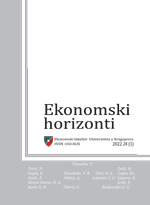The drivers of the competitiveness of firms in the non-financial sector: Evidence from Nigeria
Fatai Abiodun Atanda1 and Florence Olubunmi Osemene2
1Department of Accounting, University of Ibadan, Nigeria
2Department of Accounting and Finance, University of Ilorin, Nigeria
This study examines the key determinants of the competitiveness of firms in Nigeria. It draws the firm-level (i.e. firm-specific characteristics) data and macro-data (environmental factors) from the annual reports and accounts of non-financial listed firms and the Statistical Bulletin of the Central Bank of Nigeria, respectively. In addition, it employs descriptive, inferential and econometric tools to analyze the data. The results reveal that the age of a firm, its productive assets, profitability and the capital expenditure ratio of the government enhanced the competitiveness of high-competition firms, on the one hand, while the high cost of finance hindered it, on the other. However, profitability, business risk, the size of a firm and inflation contributed to the competitiveness of low-competition firms, on the one hand, while sales growth and employees’ capacity reduced it, on the other. It was concluded that both firm-specific and environmental factors played the beneficial and detrimental roles when the level of the competitiveness achieved by the Nigerian non-financial listed firms is concerned. Thus, the policy implications of these results were discussed.
Keywords: high-competition firm, low-competition firm, value creation, firm-specific factor, environmental factor
JEL Classification: M41, G32




